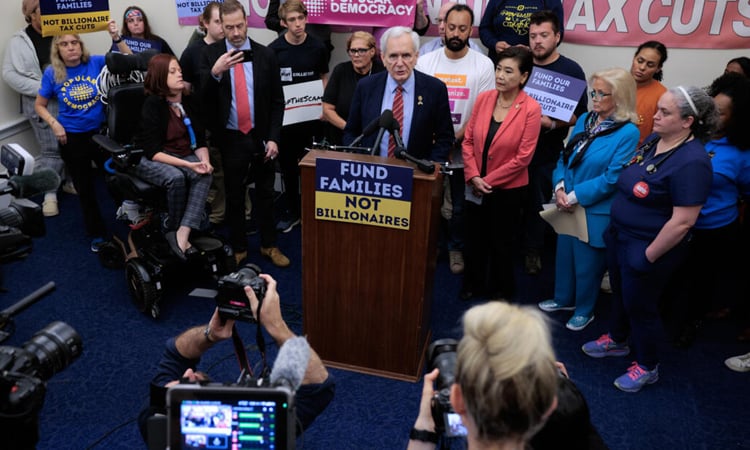News Flash
News Flash

WASHINGTON, May 22, 2025 (BSS/AFP) - Republicans announced Wednesday they will vote early Thursday on US President Donald Trump's sprawling domestic policy mega-bill pairing tax relief with spending cuts that critics say would decimate health care while ballooning the debt.
The "One Big, Beautiful Bill Act" would usher into law Trump's vision for a new "Golden Age," achieved through cuts to public services to pay for a 10-year extension of his 2017 tax cuts.
But it is dangling by a thread, with independent analysts warning it will increase the deficit by as much as $4 trillion over a decade, rattling fiscal hawks who say the country is careening toward bankruptcy.
The nonpartisan Congressional Budget Office predicted it would boost the incomes of the richest 10 percent while making the bottom 10 percent poorer, through hundreds of billions of dollars in cuts to health care and food aid.
House Speaker Mike Johnson set a May 26 -- Memorial Day -- deadline for passing the package but is anticipating attendance problems at the back end of the week and set a rare overnight vote, expected around 4:30am (0830 GMT).
The White House Council of Economic Advisors has made hugely ambitious projections, well outside the mainstream consensus, that the package will spur growth of up to 5.2 percent.
And Trump's press secretary Karoline Leavitt claimed the bill "does not add to the deficit," and would actually save $1.6 trillion through spending cuts.
But investors were unconvinced as the yield on the 10-year US Treasury note surged to its highest level since February on Wednesday amid worries over the budget-busting bill's bottom line. Major US markets tumbled well over one percent.
"My concern about the deficit and the debt is tremendous," Texas congressman Keith Self, a Republican, told CNN.
"This bill in its entirety, the way it was written: we would go from $36 trillion now in debt to $56 trillion minimum in 10 years."
- 'Devastating' -
Democrats have called the bill "devastating" for the US middle class, needling Republicans on multiple aspects of the giant package.
Its fate in the House of Representatives could reveal the limits of Trump's sway over the party's quarrelsome and deeply polarized lawmakers.
The president pressured the party to back the package in a rare Capitol Hill visit Tuesday after it hit a series of roadblocks pitting conservative fiscal hawks against moderate coastal Republicans.
Speaker Johnson can lose just three members in a vote of the full House.
Initially multiple conservatives appeared ready to reject the bill but a follow-up meeting with Trump on Wednesday -- this time at the White House -- appeared to have persuaded some of the holdouts to fall into line.
Its fate remains uncertain, however, with fiscal hawks unhappy that proposed cuts to the Medicaid health insurance program were not deeper -- a red line for moderates and possibly for Trump, who told the party in coarse terms not to touch the social safety net.
To appease his right flank, Johnson moved up the enforcement of work requirements for Medicaid recipients by two years to the end of 2026 and offered to phase out clean energy tax credits earlier.
Meanwhile a group of moderate northeastern Republicans pushing for huge increases in the state and local tax (SALT) write-off secured a compromise of a four-fold hike, from $10,000 to $40,000.
If Johnson can pull off passing the mega-bill through the House, it is likely to undergo significant rewrites in the Senate, which plans to get the package to Trump's desk by July 4.
"It's no secret how awful the Republican tax bill is," Senate Minority Leader Chuck Schumer said in a floor speech.
"For weeks, we've said their bill shows that billionaires win, American families lose."